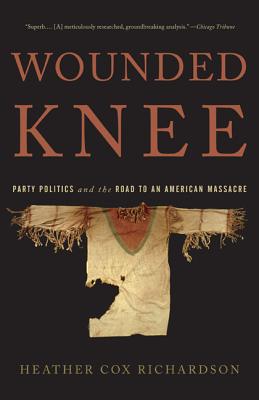History Chat - May 28, 2020
Link to Video on Facebook
Link to transcript

HCR discussed Jourdon Anderson's letter to his former owner, to illustrate how historians analyze such documents. Next week during her Thursday chats, she'll be starting a new series.
Links (underlined) related to topics covered in the chat
an annotated version of Jourdon Anderson's letter: To My Old Master: Decoding a Race Relations/Blog Hit And What It Really Means
Stand Watie, the last civil war confederate general to surrender
NYT articles about President Johnson's Amnesty Proclaimation
A podcast about President Andrew Johnson

[From wikipedia] Richardson’s first book, The Greatest Nation of the
Earth (1997), stemmed
from her dissertation at Harvard University. Inspired by Eric Foner’s work on
pre-Civil War
Republican ideology, Richardson analyzed Republican economic policies during the
war. She
contended that their efforts to create an activist Federal Government during the
Civil War
marked a continuation of Republican free labor ideology. These policies, such as
war bonds
and greenbacks or the Land Grant College Act and the Homestead Act,
revolutionized the role
of the Federal Government in the U.S. economy. At the same time, these actions
laid the
groundwork for the Republican Party’s shift to Big Business after the Civil War.

In this 2001 book, Richardson "focused on the “Northern abandonment of
Reconstruction.” Building
on the earlier work of C. Vann Woodward, she argued that a more complete
understanding of the period
required appreciation of class, not only race. As Reconstruction continued into
the 1870s and
especially the 1880s, Republicans began to view African Americans in the South
more from a class
perspective and less from the perspective of race that had driven their earlier
humanitarianism. In
the midst of the labor struggles of the Gilded Age, Republicans came to compare
“the demands of the
ex-slaves for land, social services, and civil rights” to the demands of white
laborers in the
North. This ideological shift was the key to Republican abandonment of
Reconstruction, as they chose
the protection of their economic and business interests over their desire for
racial equality."
[From wikipedia]

In this 2007 book, "Richardson presented Reconstruction as a national
event that
impacted all Americans, not just those in the South. She incorporated the West
into the
discussion of Reconstruction as no predecessor had. Between 1865 and 1900,
Americans re-imagined the
role of the federal government, calling upon it to promote the well-being of its
citizens. However,
racism, sexism, and greed divided Americans, and the same people who
increasingly benefited from
government intervention—white, middle-class Americans—actively excluded
African-Americans, Native
Americans, immigrants, and organized laborers from the newfound bounties of
their reconstructed
nation." [from wikipedia]

In this book, published in 2010, Richardson "focused on the U.S.
Army’s
slaughter of Native Americans in South Dakota in 1890. She argued that party
politics
and opportunism led to Wounded Knee. After a bruising midterm election,
President Benjamin
Harrison needed to shore up his support. To do so, he turned to The Dakotas,
where he
replaced seasoned Indian agents with unqualified political allies, who
incorrectly assumed
that the Ghost Dance Movement presaged war. The Army responded by sending one
third of its
force in order to avoid spending cuts from Congress. After the event,
Republicans tried to
paint the massacre as a heroic battle to stifle the resurgent Democrats."
[wikipedia]

In this 2014 book, Richardson "extended her study of the Republican
Party into the twentieth and twenty-first centuries. This book studied the
entire life
of the GOP, from its inception in the 1850s through the presidency of George W.
Bush.
The party’s founders united against the “slave power,” a small group of wealthy
white men
who controlled all three branches of government. These Republicans articulated a
new vision
of an America in which all hardworking men could rise. But after the Civil War,
Republicans
began to emulate what they originally opposed. They tied themselves to powerful
bankers and
industrialists, sacrificing the well-being of ordinary Americans. A similar
process took
place after World War II, when Republicans sought to dismantle successful New
Deal policies
and prop up the wealthy. However, in both cases, reformers within the party were
able to
return the GOP to its founding vision of equality of opportunity, first Theodore
Roosevelt
during the Progressive Era, and then Dwight D. Eisenhower, who enforced
integration and
maintained the New Deal. The Nixon and Reagan administrations have represented
yet another
fall from the GOP’s founding purpose. It's ironic, Richardson points out, that
Republicans
treated Barack Obama with an unprecedented level of disrespect, as Obama's rise
from humble
beginnings to the highest office in the nation embodied the vision of the
original
Republicans." [wikipedia]

In her most recent publication, Richardson argues "that America was
founded with
contradicting ideals, with the ideas of liberty, equality, and opportunity on
one hand,
and slavery and hierarchy on the other. United States victory in the American
Civil War
should have settled that tension forever, but at the same time that the Civil
War was
fought, Americans also started moving into the West. In the West, Americans
found and
expanded upon deep racial hierarchies, meaning that hierarchical values survived
in
American politics and culture despite the crushing defeat of the pro-slavery
Confederacy. Those traditions--a rejection of democracy, an embrace of
entrenched
wealth, the marginalization of women and people of color--have found a home in
modern
conservative politics, leaving the tremendous promise of America unfulfilled."
[wikipedia]